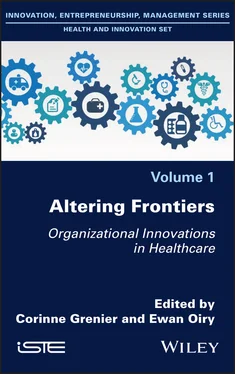5 Foreword by Jean-Louis Denis
6 Foreword by Norbert Nabet
7 Introduction
8 Begin Reading
9 List of Authors
10 Index
11 Other titles from iSTE in Innovation, Entrepreneurship and Management
12 End User License Agreement
1 v
2 iii
3 iv
4 xi
5 xii
6 xiii
7 xiv
8 xv
9 xvii
10 xviii
11 xix
12 xxi
13 xxii
14 xxiii
15 xxiv
16 xxv
17 xxvi
18 xxvii
19 xviii
20 xxix
21 1
22 3
23 4
24 5
25 7
26 8
27 9
28 10
29 11
30 12
31 13
32 14
33 15
34 16
35 17
36 18
37 19
38 20
39 21
40 22
41 23
42 24
43 25
44 26
45 27
46 29
47 30
48 31
49 32
50 33
51 34
52 35
53 36
54 37
55 38
56 39
57 40
58 41
59 42
60 43
61 44
62 45
63 46
64 47
65 48
66 49
67 50
68 51
69 52
70 53
71 54
72 55
73 56
74 57
75 58
76 59
77 60
78 61
79 63
80 64
81 65
82 66
83 67
84 68
85 69
86 70
87 71
88 72
89 73
90 74
91 75
92 76
93 77
94 78
95 79
96 80
97 81
98 82
99 83
100 84
101 85
102 86
103 87
104 88
105 89
106 90
107 91
108 92
109 93
110 94
111 95
112 96
113 97
114 98
115 99
116 100
117 101
118 102
119 103
120 104
121 105
122 106
123 107
124 108
125 109
126 110
127 111
128 112
129 113
130 114
131 115
132 116
133 117
134 118
135 119
136 120
137 121
138 122
139 123
140 124
141 125
142 126
143 127
144 128
145 129
146 130
147 131
148 132
149 133
150 134
151 135
152 136
153 137
154 138
155 139
156 141
157 143
158 144
159 145
160 147
161 148
162 149
163 150
164 151
165 152
166 153
167 154
168 155
169 156
170 157
171 158
172 159
173 160
174 161
175 162
176 163
177 164
178 165
179 166
180 167
181 168
182 169
183 170
184 171
185 172
186 173
187 174
188 175
189 176
190 177
191 178
192 179
193 180
194 181
195 182
196 183
197 184
198 185
199 186
200 187
201 188
202 189
203 190
204 191
205 192
206 193
207 194
208 195
209 196
210 197
211 198
212 199
213 200
214 201
215 202
216 203
217 204
218 205
219 206
220 207
221 208
222 239
223 210
224 211
225 212
226 213
227 214
228 215
229 216
230 217
231 218
232 219
233 220
234 221
235 222
236 223
237 225
Health and Innovation Set
coordinated by
Corinne Grenier
Volume 1
Altering Frontiers
Organizational Innovations in Healthcare
Edited by
Corinne Grenier
Ewan Oiry

First published 2021 in Great Britain and the United States by ISTE Ltd and John Wiley & Sons, Inc.
Apart from any fair dealing for the purposes of research or private study, or criticism or review, as permitted under the Copyright, Designs and Patents Act 1988, this publication may only be reproduced, stored or transmitted, in any form or by any means, with the prior permission in writing of the publishers, or in the case of reprographic reproduction in accordance with the terms and licenses issued by the CLA. Enquiries concerning reproduction outside these terms should be sent to the publishers at the undermentioned address:
ISTE Ltd
27-37 St George’s Road
London SW19 4EU
UK
www.iste.co.uk
John Wiley & Sons, Inc.
111 River Street
Hoboken, NJ 07030
USA
www.wiley.com
© ISTE Ltd 2021
The rights of Corinne Grenier and Ewan Oiry to be identified as the authors of this work have been asserted by them in accordance with the Copyright, Designs and Patents Act 1988.
Library of Congress Control Number: 2021934597
British Library Cataloguing-in-Publication Data
A CIP record for this book is available from the British Library
ISBN 978-1-78630-707-1
Foreword by Jean-Louis Denis
Adaptation, Trust and Methodology
The issue of organizational innovation in health is not new, but it is nonetheless topical. All health systems in high-income countries face significant challenges when adapting their health systems to changing demands, knowledge and preferences, economic circumstances or technologies (Denis et al. 2018). The current COVID-19 pandemic highlights the need for organizational innovation to better respond to the unexpected and ensure an adequate and accountable response. These organizational innovations are multifaceted and refer to a reconfiguration of the professional, clinical, managerial and civic logics, to name but a few, that structure the functioning of a healthcare system (Thornton & Ocasio 2008). The healthcare system has long been characterized by a significant gap between technical innovation and organizational or institutional innovation. While such a gap is not unique to the healthcare sector, it is surprisingly acute in this sector. Technical innovation in the broadest sense of the term is a powerful driver of change in the healthcare sector. New drugs and diagnostic and therapeutic technologies are penetrating the healthcare system and organizations at a speed that makes them difficult to master. What is looming in terms of cell therapies is described as a tsunami that could sweep away the healthcare system, or at least revive it without being able to escape the difficult question of costs and what should or should not be offered by our social welfare systems. Digital innovation and artificial intelligence will also bring about organizational and institutional transformations (Hinings et al. 2018).
Organizational innovation, which can be more broadly described as immaterial innovation, is difficult to bring about, or at least to such a degree that it would allow better control of so-called technical innovations. One need only think of the experience of healthcare systems in the face of the deinstitutionalization of care made possible (in principle) by the arrival of laparoscopic technologies in the 1990s. The development of ambulatory care has been slower than otherwise, and clinical or organizational environments have had difficulty capitalizing on this opportunity.
This is certainly a reflection of reasonable caution, since innovation must make it possible to produce quality care in complete safety. There is also the imprint left by professional, organizational or political rigidities that make this capitalization uncertain or late.
Healthcare is not alone in this fight for innovation. Other sectors of activity, including that of economically oriented companies, have long stressed the difficulty of renewing social relations of production in favor of greater adaptation to a constantly changing environment (Osty et al. 2007). In the healthcare sector, organizational innovations, which I would call “basic”, are also slow to materialize. Take, for example, the difficulty in linking the designation of responsibility for care, the establishment of incentives to take on this responsibility and the optimization of the use of clinical resources. The interest in France and elsewhere in the implementation of new organizational forms such as Accountable Care Organizations (ACOs) is a major challenge in terms of innovation (Lemaire 2019). More broadly, we could also highlight the difficulty for several healthcare systems to also refocus their mission toward emerging priorities (mental health, frailty, etc.). Obviously, this is not only a question of organizational innovation, but also of innovations in terms of mentalities and social relations between stakeholders. So what does this book offer us? Without claiming to do it justice in a few lines, it serves to better understand the strategies likely to promote and capitalize on organizational innovation. The interest of such a book lies not in its diagnostic scope – the problem is fairly well known – but in the avenues of response it proposes to the tricky issue of the cumbersomeness or inadequacy of organizational innovation in health. I will limit myself to some remarks on the three main theses that make up the three parts of the book. These three themes are partly overlapping and I will come back to them in conclusion.
Читать дальше











